Week beginning 21 March 2022
Hi everyone
We hope you’re feeling happy and healthy at home. We miss having you in school but we want you to know that you’re still very much part of our school community. Enjoy your home learning for this week.
Maths
Follow this sequence of maths learning which is linked to fractions.
- Lesson 1: video, worksheet, answers
- Lesson 2: video, worksheet, answers
- Lesson 3: video, worksheet, answers
- Lesson 4: video, worksheet, answers
- Lesson 5: video, worksheet, answers
- Lesson 6: video, worksheet, answers
- Lesson 7: video, worksheet, answers
- Lesson 8: video, worksheet, answers
- Lesson 9: video, worksheet, answers
- Lesson 10: video, worksheet, answers
You don’t have to print the worksheet. Your child can write or draw their answers on paper. Your child’s learning will be most effective if you sit with them to pause the clip and check / praise / support your child as the clip moves on.
Practise times tables on Times Table Rockstars, too. If your child is in Y3, we’re concentrating on the 8 times table. If your child is in Y4, we’re concentrating on all times tables up to and including 12 x 12. Email the class teacher if you need your child’s login and password details.
(Suggested time: 30 minutes of Maths and 15 minutes of Rockstars daily)
Spelling
Look on the homework page to find this week’s spellings. They should choose some past spellings that they feel less confident with. Your child should complete one task each day.
- Day 1: Generate more words linked to the spelling pattern or ‘rule’. You could look out for the words in the book you’re reading at home, or any other text, like a website linked to our science topic of Living Things and their Habitat.
- Day 2: Practise the spellings using two of the ideas in our Super Spelling Strategies guide. (Set yourself and others at home a challenge of using some of the words when you’re speaking, too!)
- Day 3: Write separate sentences, each containing one of the spellings. (Don’t forget to show off really neat handwriting and make sure you sentence starts with a capital letter and ends with a full stop, exclamation mark (!) or question mark (?).
- Day 4: Repeat Task 2 or 3.
- Day 5: Get an adult at home to test you on your spellings. Practise any you spell incorrectly – you could write them out carefully until you’re sure.
(Suggested time: 15-20 minutes daily)
Reading fluency
This is the text we’re using in class this week to build up fluency skills.
In school, we generally follow this sequence:
- Day 1: Read the text aloud with your child listening. Read it clearly and slowly, pointing to each word as you read. Have a chat about any unfamiliar words.
- Day 2: Read aloud each sentence (a full short sentence or part of a longer sentence), and have your child read it back to you. Do this ‘echo reading’ for the whole text.
- Day 3: Read the text and talk about the effect of the punctuation on how you read it – pauses for full stops and expression for exclamations (!) or questions (?). Your child reads the text aloud.
- Day 4: Read together with expression (just like you practised on Day 3).
- Day 5: Your child reads independently and fluently.
(Suggested time: 15 minutes daily)
Reading comprehension
We’ll be using this RIC text in class to answer these questions to practise comprehension skills. RIC stands for:
- Retrieve: finding information in a text
- Interpret: using clues in the text to unlock information
- Choice: thinking about the author’s choice of words, techniques or organisation that make the text interesting and enjoyable to read
Follow these lessons from Oak National Academy. There’s a whole series of lessons, but start at Lesson 1 and work through, doing one (or maybe even two) each day. (If you’re self-isolating in your second week, stick with the series of lessons you’ve already started and aim to complete the full series.)
(Suggested time: 30 minutes daily)
Writing
Follow these lessons from Oak National Academy. There’s a whole series of lessons, but start at Lesson 1 and work through, doing one (or maybe even two) each day. (If you’re self-isolating in your second week, stick with the series of lessons you’ve already started and aim to complete the full series.)
(Suggested time: 30-40 minutes for each)
Topic
Our topic this half-term is about computing.
Follow these lessons from Oak National Academy. There’s a whole series of lessons, but start at Lesson 1 and work through, doing one (or maybe even two) each day. (If you’re self-isolating in your second week, stick with the series of lessons you’ve already started and aim to complete the full series.)
(Suggested time: 30-40 minutes)
Science
Our focus this half-term is about working scientifically.
These six lessons from Oak National Academy link closely to what we’ve been doing in class. Start at Lesson 1 and work through, doing two or three in the week. If you’ve previously completed on of these lessons, have a go at the ones you haven’t completed yet.
If Science really motivates your child, you could also use look at these lessons all about practical Science.
(Suggested time: 30-45 minutes)
PE
Don’t forget to do some daily exercise!
Do two or three of these Five Minute Moves from Joe Wicks each day – spread them across the day as if they were playtimes, maybe!
Try working through this series of 25 lessons from the Association for Physical Education – do two or three in the week.
(Suggested time: 5 minutes daily, plus 30 minutes for the longer PE lessons)
Extra stuff…
As an extra (or as an alternative, if this helps to motivate your child)…
Fancy learning about a new religion? You don’t have to be religious to learn about, and appreciate, religions from all around the world. Check out this set of lessons from Oak National Academy – you could choose to focus on one religion or dip into each set for an overview.
What about some Living and Learning? While you’re away from school, you could check out these lessons on keeping safe!
This week’s message (Friday 18 March 2022)
Almost exactly two years ago, schools were closing for the start of the first lockdown. Numbers of Covid-positive cases are rising again, and we’re really noticing that in our Sphere Federation schools – we’ve had close to ten staff members absent each day this week.
On a much more positive note, with daffodils springing up and the weather looking brighter, it’s really starting to feel like Spring.
This week, amongst the various messages, we’ve one related to Covid. We’ll start with an important one about reading…
The benefits of reading at home
A recent news article caught our eye. The article talks about a research study about trips to museums and art articles, which suggests that such activities don’t improve exam results. (The article also points out other research indicates cultural trips like these have lots of other benefits, even that they ‘could actually lead to a longer life’.)
What we thought was more significant was the findings about reading – findings that come as no surprise:
…researchers did find that reading activities by both parents and their children played a role in exam grades. They measured activities such as reading for pleasure, visiting a library and discussing books at home. Such activities boosted GCSE scores by a significant amount.
Parents often ask how they can support their child more. Our advice would always be to make sure your child’s reading and talking about what they’re reading.
Brighten someone’s day
The theme of this year’s Comic Relief fundraiser is ‘You’ – inspiring people to do something, however modest, to brighten someone’s day. A lot of those uplifting actions, we’d venture, can easily be accomplished online. Check out this poster highlighting ways that we can all spread some much-needed happiness through the digital world. What about each person in your household agreeing to do one thing each week?
Dealing with worrying content online
In contrast, this poster addresses the timely and delicate issue of speaking with children about worrying content they’ve seen online. Your child, by now, could well be very aware of the situation in Ukraine, even if they’re not quite old enough to comprehend it fully. Many will have watched or read potentially upsetting news items online covering the invasion – and, in all likelihood, will need extra reassurance from trusted adults during these unsettling days. Check out the practical advice on raising the subject with young ones, allowing them to express their concerns, and helping them to avoid feeling overwhelmed by their fears.
Covid vaccination for at-risk 5 to 11 year olds
The Department for Education has asked us to share the following information with parents and carers of at-risk 5 to 11 year olds…
Children aged 5 to 11 years who are in a clinical risk group or who live with someone who is immunosuppressed can get the COVID-19 vaccine, in line with advice set out by the Joint Committee on Vaccination and Immunisation (JCVI). Eligible children include those with diabetes, immunosuppression, learning disabilities, and other conditions as outlined by the UK Health Security Agency (UKHSA) in the Green Book.
Vaccinations help to increase protection against COVID-19, which is particularly important for those with underlying health conditions.
Further information is available in the guide for parents of children aged 5 to 11 years published by UKHSA. We have published some frequently asked questions on the vaccination programme including information on eligibility, accessibility and advice for parents of children at high risk from COVID-19. Following advice from the JCVI, healthy 5 to 11 year old children will also be offered two 10 microgram doses of the COVID-19 vaccine. The NHS will prepare to extend this non-urgent offer to all children during April.
As we said at the start of the message, it’s really starting to feel like Spring’s in the air. Enjoy that feeling this weekend!
A super, sunny week!
This week, we’ve made the most of the glorious weather! The children have loved being outside in the fresh air. From making soup in the sandpit to making mud pies in the mud kitchen, we’ve some fantastic imaginative play.
Literacy
On Monday, we started our new focus story, The Tiny Seed by Eric Carle. After reading the book, we talked about the events, looked at some key vocabulary and made story maps. Next week, we’ll continue to look at this book, discuss what plants need to grow and plant our own tiny (sunflower) seed.
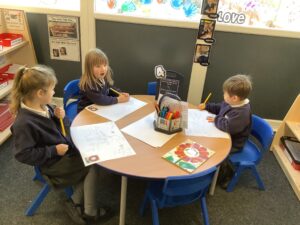
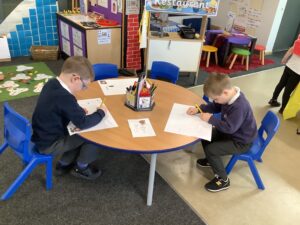
Music
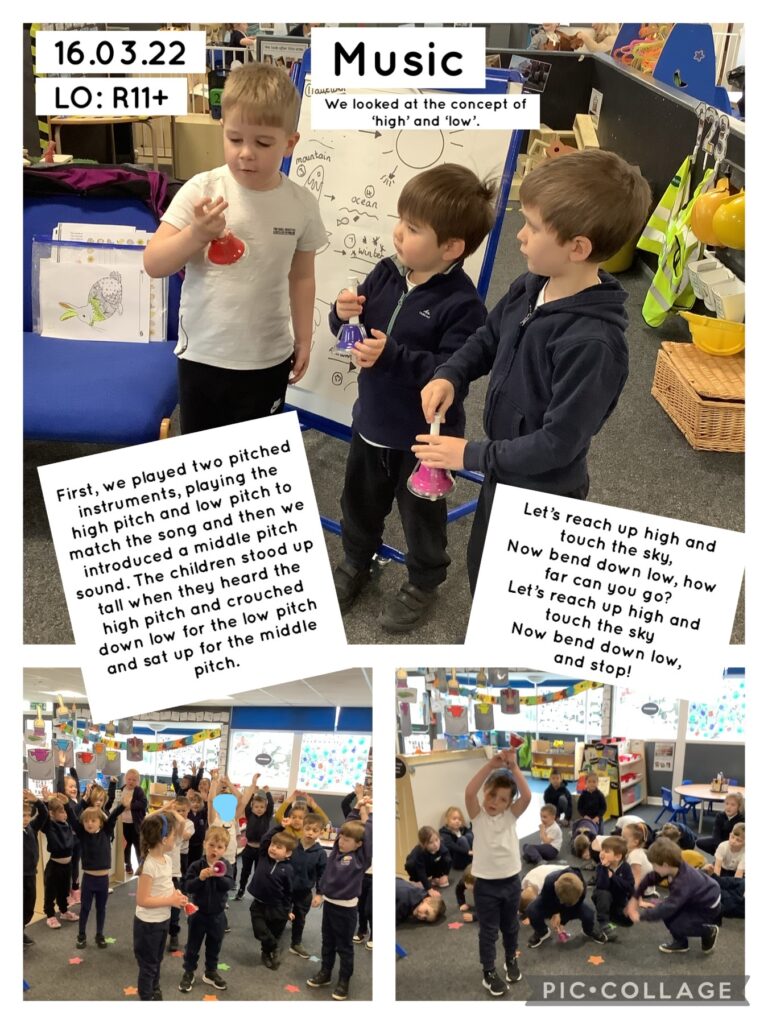 Maths
Maths
This week, we looked at the composition of seven. We used lots of different resources such as Numicon, multilink cubes and beanbags to show our parts.

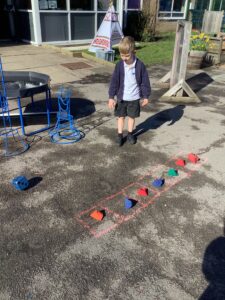
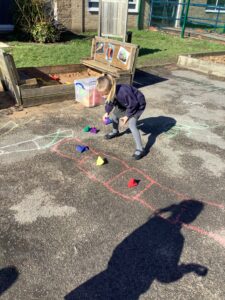
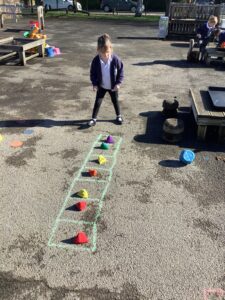
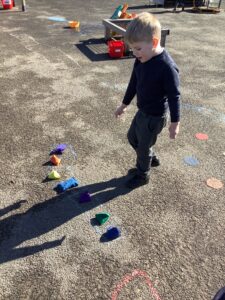
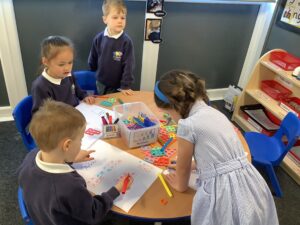
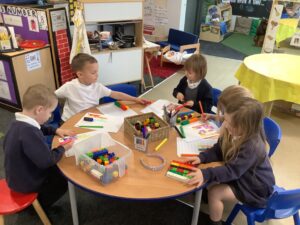
In the areas this week, we’ve seen lots of children being independent learners and completing the chilli challenges.
Here they are in action…
Making spring gardens in the playdough area.
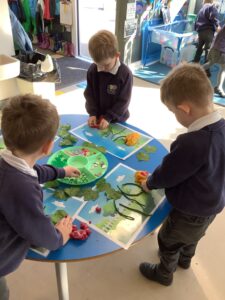
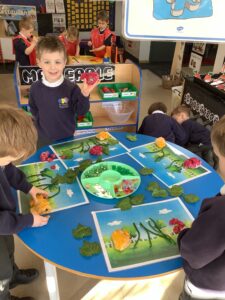
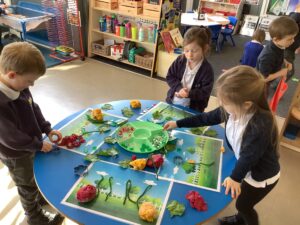
Playing take away a tower of 8 with a friend.

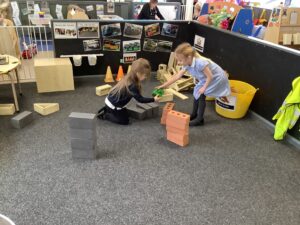 Reading tricky words on carrots.
Reading tricky words on carrots.
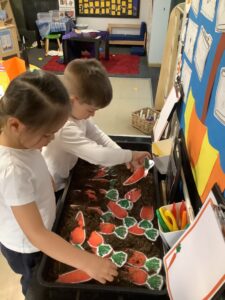 Blending words in the ball pool.
Blending words in the ball pool.
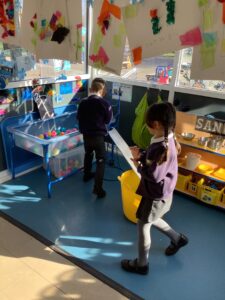
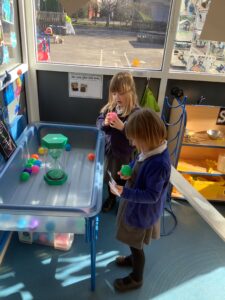
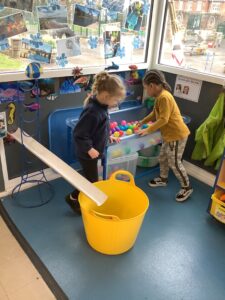 Working out the missing whole on the part-whole models.
Working out the missing whole on the part-whole models.
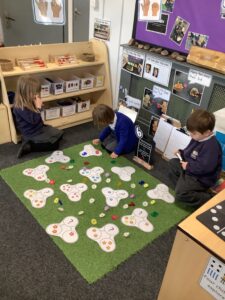
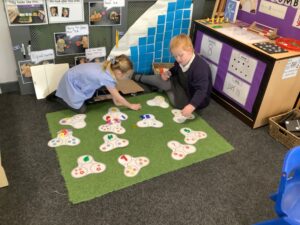
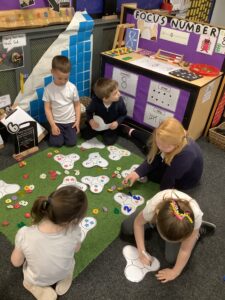 Home-Link Challenge
Home-Link Challenge
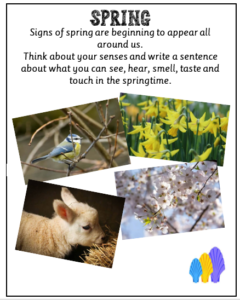
Coming up…
Thursday 24 March – PTA cake sale
Monday 28 March – Whole school farm visit
Monday 28 March – Decorate an Easter egg competition
Thursday 30 March – Easter service at St James’ Church
Friday 01 April – Break-up for Easter
Enjoy the spring sunshine this weekend!
18 March 2022
The /f/, /l/, /s/, /z/ and /k/ sounds are usually spelt as ff, ll, ss, zz, ck if they come straight after a single vowel letter in short words. This week’s spellings for year 1 follow this rule.
Y1: off, well, miss, buzz, back
This week’s spellings for year 2 will focus on suffixes. A suffix is a letter or group of letters that goes on the end of a word. Adding suffixes changes their meaning.
Y2: enjoyment, amazement, sadness, kindness, careful, playful, hopeless, plainness, badly, loudly

18 March 2022
This week we have been learning about the -tial and -cial spelling pattern.
Please learn the following words for a test on Thursday 24 March
- controversial
- official
- commercial
- special
- artificial
- glacial
- social
- influential
- confidential
Reading with prosody
We have started talking about prosody in our reading practice sessions.
Prosody is the rhythmic and intonational aspect of speech that manifests as expressive reading. It comprises timing, phrasing and intonation, and helps to convey meaning and add ‘life’ to reading.
It is basically reading with expression.
We have been reading and talking about Owl Babies and trying to add prosody when reading certain sections. Ask your child to read this page with prosody.
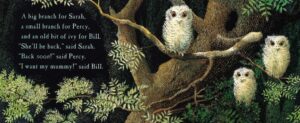
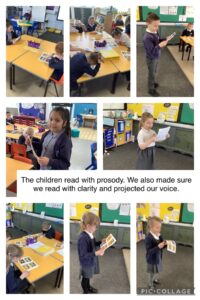
18 March 2022
Living and learning provides the focus for this week’s Talk Time.
I can describe what to do in different sorts of emergencies.
An emergency situation is when there is an immediate risk that needs to be addressed right away.
We suggest approaching this Talk Time in two parts. First, where and when might you face an emergency? Think of a range of settings and scenarios.
After that, consider what your response would be. If there’s not a trusted adult around, call 999 if possible. The LIONEL acronym below is one that we’d like you to learn. It will help you if you ever need to phone the emergency services.
L – Location – Tell them where the emergency is and where they need to come to.
I – Incident – Tell them what has happened.
O – Other services – Do you need the ambulance, police and fire service?
N – Number of people – How many are involved?
E – Extent of injuries – How badly are they hurt?
L – Location – Repeat again where they need to come to.
Science – microbes
We have been working scientifically in science this half term and also learning about microbes, linked to preventing illness and cleanliness.
We used pepper in a test today to represent microbes. We filled a dish with water. We put a stick in the water. It got wet! We then dipped the stick in a dish filled with water and pepper . The pepper stuck (like microbes do to our hands when we touch anything). Finally, we dipped our stick in a bowl of washing up liquid and water. When we dipped it in the water again, the pepper moved away like magic! There was a gasp from everyone! This shows us that microbes (that sometimes make us ill) do not like soap and that is why we use it to wash our hands.
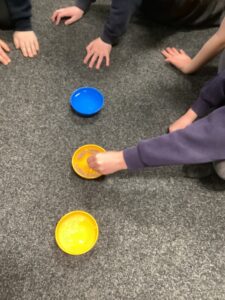
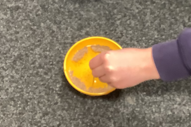

Recorders
Year 3 have been learning to play the recorder with Mrs Bald. Today, they rehearsed playing to the tune of the rhyme ‘Hot Cross Buns.’
The children will be performing at St James’ Church on Thursday 31st March and the service will begin at 2pm. Please join us if you are able to.






Year 5 & 6 ‘rulz’… Yeah, it does!
Our cloakroom has a plethora of compliments, boosts and celebrations of friendship! It’s only March and I think we’re rapidly running out of space!
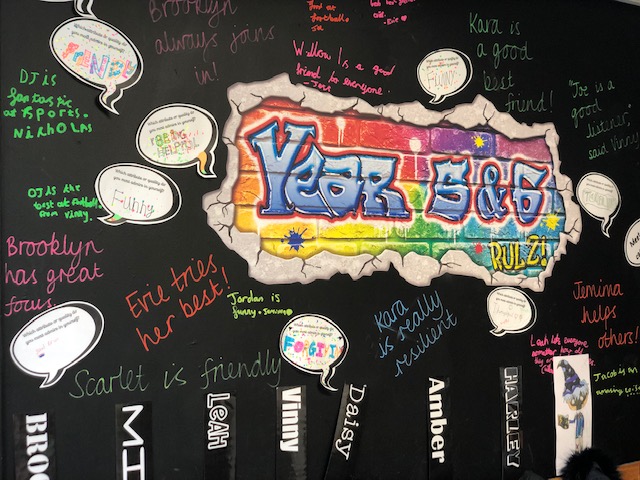
It’s great to see the children being so positive about their classmates.
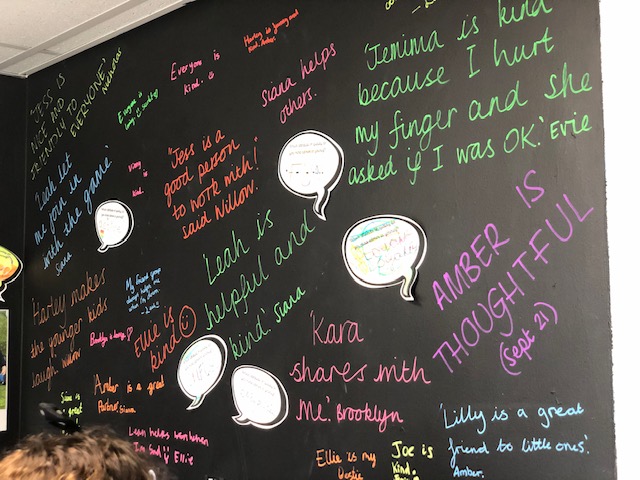
If children catch someone being friendly, kind, helpful or just generally being an all-round top person, they can grab a chalk pen and scribe on our communal cloakroom wall to share that moment with us all! Nice one, Y5/6!